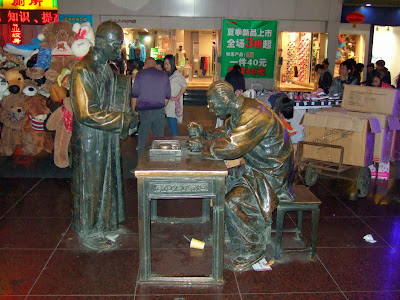Travel Dates 15th - 17th April 2012.
Click on any picture to see a larger version.
Zhengzhou is not a tourist city. It
probably has some ancient sites or modern wonders but that was not
our reason for staying in Zhengzhou. Like tens of thousands of Chinese rail
travellers every day we had to change trains there. Take a look at the rail
system map on my previous post and you will see that the main line
from Guangzhou/Hong Kong in the south to Beijing and places north
crosses the major east-west line from Tibet to the coast at
Zhengzhou.
 |
In front of the railway station is a
huge open paved square. Thousands of people awaiting trains fill the
square daily. Many appear to be travelling with all their worldly goods and spend the night in the square. I deliberately
chose a non-vacation period to visit China, knowing the trains are
crowded during vacations. I wondered what that square and those
queues would be like during vacation time.
We decided to stay a couple of nights
to see an ordinary city away from the tourist traps. From arrival to
departure we never saw another non-Chinese tourist. The only other
laowai I saw were the guest workers from the sub-continent in the
English-speaking queue when I bought my rail tickets to Xi'An.
In several ways it was surprising. The city is very modern in parts, especially down-town, but quite traditional in other areas. The
influence of global companies was very evident. The fast food giants
such as McDonalds and KFC are there, as are many major electronics
and car manufacturers. Some may not have been genuine. The Apple store made me wonder about that but it did not seem to
bother the long lines of potential purchasers waiting to buy.
There was a clear rich/poor divide
which was often also a young/old divide. In the station square the
majority were family groups: mum, dad, grandparents, little children.
Their clothing and goods were adequate but definitely chosen for
function, not fashion. They appeared to mostly be from rural regions.
By contrast the majority of the people thronging the department
stores and down-town shopping precincts were aged from adolescence to
mid-30s, well-dressed and well-heeled.
There were markets to suit all income levels. Down-town had the up-market stores.
Nearby was an underground market that seemed to extend for a very long distance under the footpaths and roads with mid-range pricing.
Nearer the station were cheaper and more traditional markets in the side streets and alleys.
 |
| Baby tortoises for sale in the street market. |
We stayed at the Jianjing Inn Rail hotel. Nobody understood
English or my terrible attempts at Chinese. It became hilarious at
one stage. We discovered mosquitoes in the room. As we had already
changed rooms to get away from one that reeked of cigarettes (hold nose and look disgusted) and
another next to the railway tracks (cover ears and look pained) we did not want to change again.
I went to reception to ask for an insecticide spray. There was no way
I could get them to understand my need. After fifteen minutes of
increasingly frustrating mutually incomprehensible attempts I finally
pranced around reception waving my arms like I was flying making
'bzzz' mosquito sounds, then stopped and held an invisible spray-can
in my hand going 'hissss'.
We were given a can of spray when they
finally stopped laughing.
This apartment block was beside the hotel entrance. It was typical of the housing in that district.
The traffic in China's cities was often terrifying for us as pedestrians and sometimes as taxi passengers but we rarely saw an accident. However, this van driver outside our hotel would have preferred to miss the bus.
 | |
| These two traders in a local ethnic group's traditional dress sold home-crafted jewellery. |
 |
| This sculptor had several pieces in the down-town shopping district. |











No comments:
Post a Comment